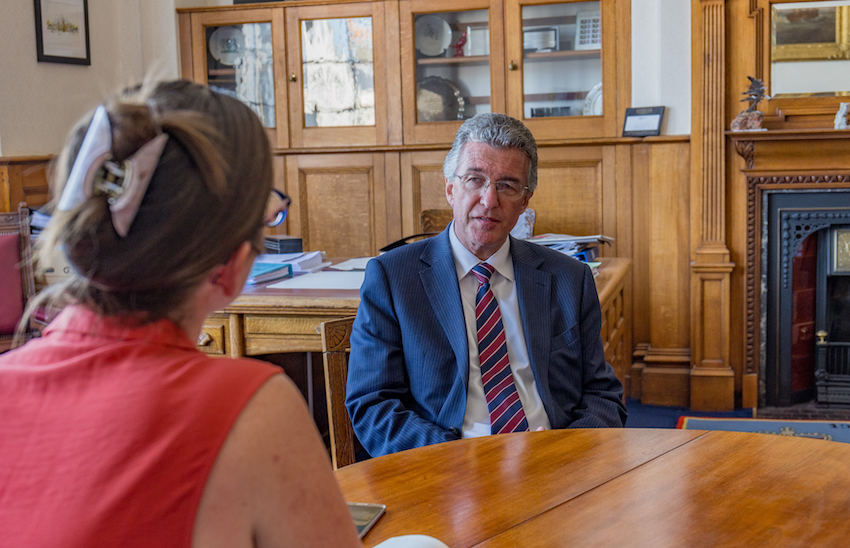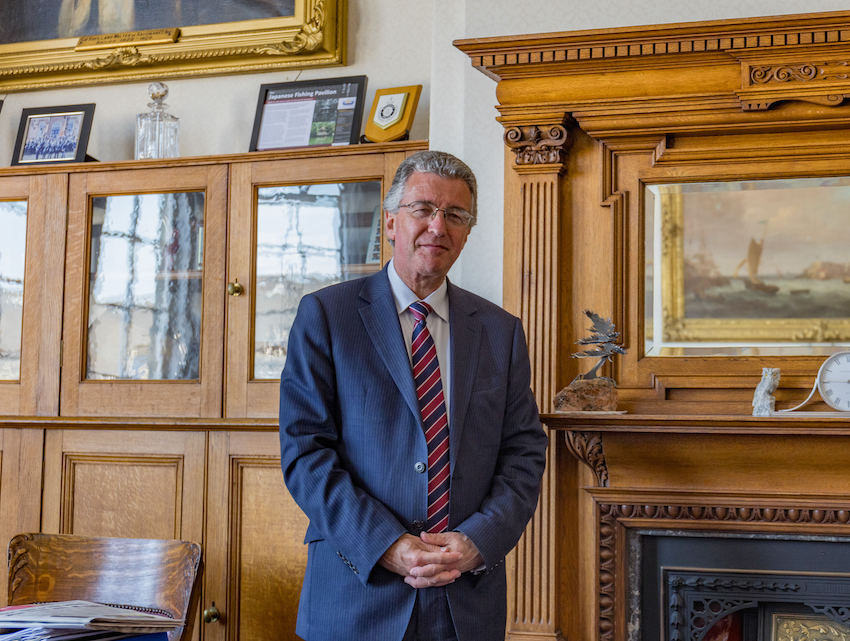


Sir Richard McMahon was knighted in King Charles III’s first birthday honours list but he was quick to point out that the award does not just reflect his long career of public service and academic achievement, but also reflects the hard work by everyone in the Bailiff’s Chambers.
Their input enables him to carry out the duties he needs to do as part of his day job.
“This is a working office so although it looks chaotic, you know where everything is, and that's all that matters,” he explains welcoming us into his office – which is far from messy, but does contain two desks. One Sir Richard works on most days with his computer, and current case papers while the other desk is covered in neat piles of papers, with boxes of papers neatly stacked around the room.
It’s clear that being Bailiff comes with a heavy workload and is a role that is held in high regard by the monarch.
“It is a personal honour because obviously it's me that gets it (the Knighthood), but I think it's fair to say that it's recognition of the office of Bailiff, and a number of my predecessors have been similarly honoured.
“I think that leaves the office of Bailiff in good standing amongst the community, and that people are pleased. I hope they're pleased anyway, that the current holder gets that same recognition as his predecessors. But there's a huge team of people here working in the courts, working in the parliamentary side of things without whom I couldn't actually do what I'm doing. So although it's my honour, it's actually something that could be shared.”

Sir Richard is no stranger to the quintessentially British regime of awarding honours bestowed in the monarch’s name to various people twice yearly, as it his office that deals with the nominations.
“Nominations for national honours come to me, and then we have a process that means we sift through the nominations we get. And I do hope that people will continue to put forward any member of the community whether it be here in Guernsey, in Alderney or in Sark where it's a different process as well if they think that there's somebody who deserves recognition.
“We're blessed with people who do wonderful things, and therefore, let's have as many nominations as possible.It's better to have too many than to have too few.”
His own honour – a Knighthood - follows a four-decade long career in law, which included a period as a university lecturer of law and a solicitor in England before moving to Guernsey in 1995 as a Legislative Draftsman. He was called to the Bar first in England, then in Guernsey.
In 2000 he was appointed a Crown Advocate and Director of Civil Litigation, in 2008 he was appointed External Relations Policy and Legal Adviser, and in 2009 he was appointed Her Majesty’s Comptroller, before being appointed Deputy Bailiff in 2012.
He was sworn in as Bailiff in 2020.
“I often describe it as multi-faceted because in a larger place you wouldn't have the concentration of functions in a single person because first and foremost to me at least the Bailiff is a judge - the role of Chief Justice if one can put that label on it. It is the primary part of the function.
“When we were doing some work 20 years ago, we described the Bailiff's role as being at least 60% judging, 20% parliamentary, and 20% civic functions. Those are the three elements of the office.
“It may be that occasionally parliament takes a little bit longer because the States tend to sit now for more days than they would have done 25 years ago. But that that was how we described it for the benefit of the European Court of Human Rights, and I think that still holds true today that it is principally being Chief Justice.
“It's also the Speaker in the States of Deliberation as Presiding Officer, which is a significant role, and the third string is being involved with a number of organisations whatever they might be across the charitable sector.I don't have as many as His Excellency or Mrs Cripwell but I certainly get across a wide range of different organisations.”

When asked what his favourite part of his day job is, Sir Richard is clear that he thoroughly enjoys serving the island in whatever capacity is needed each day.
“Intellectually, sitting as a judge, and personally getting out and about doing the civic functions, meeting the people,” he said.
"Although that makes it sound as though the least important or the least enjoyable element of the role is Presiding in the States of Deliberation that would not be correct, because I've been in and around the States all my working life, first as a civil servant, then as a Law Officer, then the Deputy Presiding Officer and now as Bailiff and I thoroughly enjoy whatever I have to do in the States.”
With talk of splitting the role of Bailiff so that the judicial and parliamentary roles are carried out by different people cropping up with irregular regularity, Sir Richard acknowledges that it is something that will undoubtedly be looked at again.
“It's always possible that the States, because the States have the entitlement to decide who ought to be their Presiding Officer if they choose to, remove the Bailiff from presiding in the States. Then there would have to be a change to the reform law. But that could be achieved by putting it forward for a royal action. If they were to do that, I'd understand why.
“It's fair to say that it's been an issue in Jersey more than an issue here. One can go back to Clothier, one can go to Carswell, where both the Lordships reported on matters about removing the Bailiff from presiding in their States Assembly but the Bailiff is still there in Jersey and the Bailiff is still here in Guernsey.
“I think that we offer a different approach to if they were choosing their own Presiding Officer who may come with some political baggage.”
While the role may change in the future, for now Sir Richard’s successor is likely to have the same duties. Jessica Roland is Guernsey’s first female Deputy Bailiff and will likely be the island’s first female Bailiff too. Looking further into the future, Sir Richard is keen to encourage anyone else interested in following in his footsteps to do so.
"The route to becoming Bailiff is to qualify as a lawyer -in the last 100 years, it has been. All Bailiffs have had a legal qualification so if there is any young person out there who might think that they would like to become Bailiff as the culmination of their careers then they would probably need to go off and get a legal qualification, ideally then become an advocate for the Royal Court.
“And then if they wanted to, apply for the office of Deputy Bailiff or whichever office it might be to come into the system that way.
“I'm a firm believer in aspiration. If somebody has the desire and plots their way through it, then it should be achievable.
“I was working at the Law Officers Chambers for a number of years. I didn't work in private practice so I'm unusual in some respects in that I've never been at the private bar here in, but more recent Law Officers have been drawn from the chambers of the law. So people have come through as advocates, and then become Law Officers. The last person to come in from outside was Mr Van Leuven in the early noughties. And it's fair to say that I've been bracketed in the office of Deputy Bailiff by the current Deputy Bailiff coming from private practice. And Sir Richard (Collas), when he came from private practice into the office of Deputy Bailiff before me. So I'm the one who followed the more traditional route.Although I didn't do the Office of Procurer. The last person to have done all four of the crown offices was Sir Geoffrey (Rowland).
“You've got to put the hard work in. It might be that the bar is of such a size now that there will always be people from the bar who want to aspire to those offices. And so you can't really do it without being a lawyer. But if you're going to be a lawyer or you think well, I know that's what I want to do, I'm going to become a lawyer then there are a multitude of routes now to it.
“You could come through the law officers. You could come directly from the private bar.
“Who knows what the routes will be.”
Comments
Comments on this story express the views of the commentator only, not Bailiwick Publishing. We are unable to guarantee the accuracy of any of those comments.